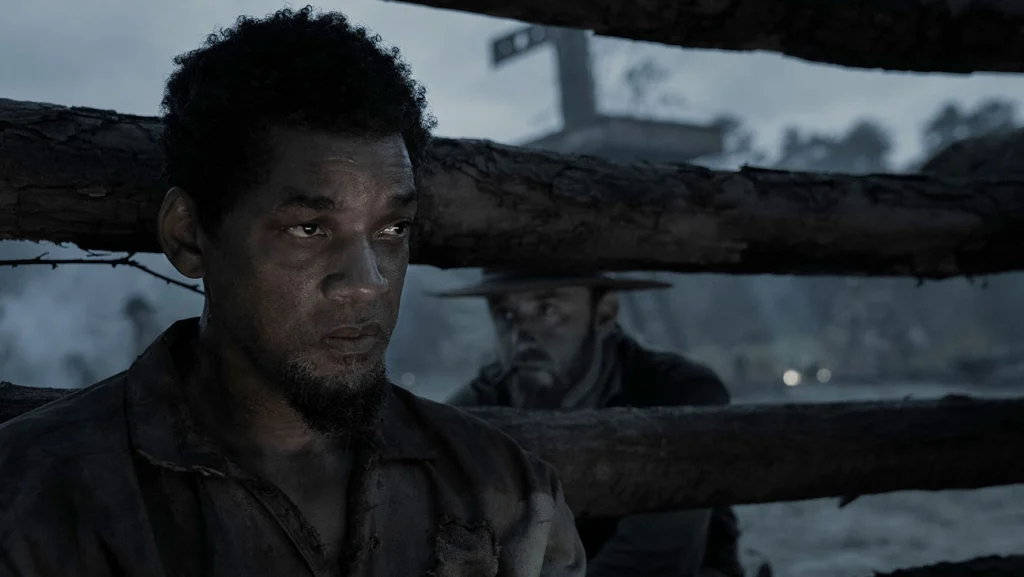Slavery is still a wound in the United States that won’t go away more than 150 years after the Civil War ended. The 1863 portrait of “Whipped Peter,” whose lacerations served as shocking evidence of unconscionable mistreatment by his white “masters,” is perhaps the most potent image we have of a once-enslaved person. Antoine Fuqua’s “Emancipation” is a bracing and still important attempt to confront this traumatic heritage head-on in recognition of this. Much like Fuqua did with this brutal depiction of a free man’s escape, that image, which was extensively shared during the Civil War, pushed the world to confront the harshness of this system.
With its meticulously composed, nearly black-and-white frames and desaturated to the level of Civil War photographer Matthew Brady’s bleak battlefield tableau, “Emancipation,” which stars an intensely focused and unusually low-key Will Smith as Peter, can be intense and at times almost unbearable to watch. Audiences will shield their eyes, sob, or both after witnessing Black men being tied and beaten, having their limbs torn off by dogs, and having any kind of resistance met with a gunshot to the head or back.
Smith portrays Peter as a man of faith who is contrite before God yet resolute against people. He communicates with his family in French and with a strong English accent with everyone else. The majority of the time, Peter remains silent, placing the onus on Smith—who is more than capable—to express what this man wants: freedom for his family, respect for himself, and justice for his tormentors, despicable people like Fassel (Ben Foster), who views his job of tracking runaways as some kind of sport.
Fuqua depicts Peter and the other slaves in the railroad work camp being made to walk in shackles, being housed in wooden enclosures, and being fed food that is unfit for human consumption. Peter is admonished for failing to glance up when instructed to do so after being advised to drop his eyes only a second before. A soldier murders one of his fellow workers in the backdrop. Peter is instructed to bring the body to a mass grave and spread lime over the corpses as another collapses at his feet.
By this point, we’ve seen enough to understand Fuqua’s argument that learning about slavery is nothing compared to experiencing it. Slavery is an abstract idea for many people until they witness the cruelty firsthand; it is taught in schools but not completely understood. That is changed by “Emancipation,” which vividly depicts the suffering faced by Peter and millions of other slaves. However, it is also a survival epic in the adventure genre, and on that level, the film occasionally struggles to be entertaining despite several B-movie plot devices.
By this point, we’ve seen enough to understand Fuqua’s argument that learning about slavery is nothing compared to experiencing it. Slavery is an abstract idea for many people until they witness the cruelty firsthand; it is taught in schools but not completely understood. That is changed by “Emancipation,” which vividly depicts the suffering faced by Peter and millions of other slaves. However, it is also a survival epic in the adventure genre, and on that level, the film occasionally struggles to be entertaining despite several B-movie plot devices.
Although breathtaking to witness, the Civil War montage that ends the movie is even more impressive. Narratively, this drawn-out conclusion puts an abrupt end to Peter’s mission: How will he get to Dodienne if he perishes on the battlefield? However, philosophically, it makes a crucial claim: For Peter, personal independence was only the start. This hero was dedicated to overthrowing the system that had so brutally treated him despite being turned immortal by that photograph and standing in for hundreds of others who have been forgotten by history. Most of us know what to anticipate when Smith eventually exposes the characters back to the camera, but that doesn’t guarantee we’re ready for the sight. The movie “Emancipation” asks us to take another look at those lashings and every other assault on human dignity it shows.
